News
Student Spotlight: Grace Joseph’22 (Clinical/School Psychology, Psy.D)
Restoring the Family and Community
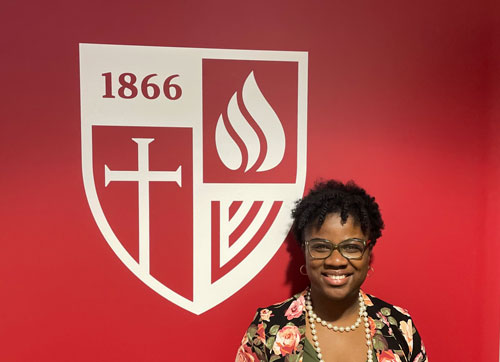
This week, we are shining the spotlight on Grace Joseph’22 (Clinical/School Psychology, Psy.D) as she completes her doctoral degree.
Joseph studied the benefits of implementing social emotional learning and restorative justice practices.
Tell us about your dissertation!
My current dissertation topic is Examining DBT STEPS-A and Restorative Practices at the High School Level.
Essentially, I’m examining the benefits of bolstering disciplinary measures with Social Emotional Learning Skills.
My study is the first of its kind. It’s designed to reconnect the student back to their school’s community, interrupting the school-to-prison pipeline, and equip students with life-long coping skills they may carry into adulthood.
We reviewed four modules:
- Emotional regulation
- Distress Tolerance
- Mindfulness
- Interpersonal Effectiveness
I spent my time teaching these modules to at-risk students in an alternative high school.
The participant that successfully completed the entire study had very promising results! I was overjoyed to see how effective it was for her. It was a complete transformation.
Her teachers also noticed the change in her academics, attention, attendance, increased maturity, and increased problem-solving abilities.
Tell us about your internship!
I am currently doing an internship with the University of Buffalo’s Counseling Center. I’ve been here since August.
I do a lot of things and essentially serve in the same capacity as senior staff.
For example, I…
- Provide individual counseling to college students
- Run group therapy sessions, including a Connections Group and a Body Image and Eating Concerns Coping Skills Group
- Offer crisis intervention
- Supervise incoming practicum students
- Provide campus outreach, serving as a bridge to students who are not utilizing our services with the aim of fostering a sense of community, discussing potential barriers, and ensuring inclusivity of marginalized groups
I love the staff here. They’re beyond supportive, knowledgeable, and helpful.
There’s an amazing sense of work-life balance here. Sometimes as a busy student, I forget to take time for myself, but my coworkers help me remember that I can’t pour from an empty cup.
I’m pretty lucky and beyond blessed to have this internship. This experience has been absolutely transformative and has truly allowed me to refine my clinical capacities and to show up as myself.
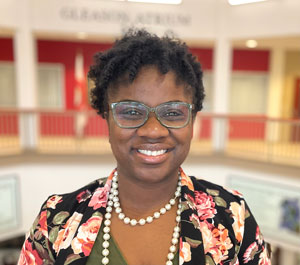
How do you use your Roberts education to inform your current career?
Roberts has provided a foundation for everything. I feel very solid and secure in my clinical skillsets and who I am as a developing clinician.
As far as education goes, this college taught me how to assess and evaluate situations from both a school and clinical standpoint. I’ve expanded my repertoire of skills for the numerous cases that I encounter.
Roberts has awarded me the ability to view things from a different perspective.
I am truly appreciative of the dual program and how it has allowed me to become more of a well-rounded practitioner.
Coming into the field of psychology, people tend to fall into two camps: you’re either going to work in academia or as a practitioner. The faculty here at Roberts taught me that doesn’t have to be the case.
I’ve learned how to think outside the box when it comes to psychology and the diverse range of work I can do.
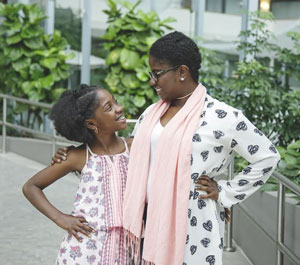
Here's a photo of me and my daughter, Taliyah.
What are your career plans after graduation?
My immediate goal is to become licensed and work for a community mental health clinic.
I have roots here in Rochester. I have been here since 2011 and would like to stay here to meet the tremendous need for services.
There are not many clinicians of color and it’s truly important for me to serve the community as much as I can with the hopes of potentially serving as a colleague, mentor, and/or even supervisor to other clinicians of color.
After meeting my immediate goals, perhaps in three to five years, I’ll open up my own practice focusing on serving BIPOC (Black, Indigenous, and People of Color).
Additionally, I want to provide workshops, advocacy, consultation, groups, and even one day training opportunities to clinicians.
Although graduation is right around the corner, I aim to engage in continuous lifelong learning. The learning never stops.
What is the best thing about studying your field?
I love being an agent of change and an advocate.
I love this quote, “You can’t change the world, but you can change someone’s world.”
Being a part of someone’s journey and assisting them to overcome barriers that have interfered with their ability to thrive is the most gratifying experience.
I truly feel that this career chose me and I am truly blessed to be able to do what I love.
What course (so far) has been your favorite and why?
My two favorite courses are Play Therapy with Bethany Claes and Marriage and Family Therapy with Sonnette Bascoe.
My favorite thing about the Play Therapy course was learning how play therapy, specifically sand tray therapy, can help anyone, not just children.
Sometimes, we can’t find the right words to say, and that’s okay. The sand tray is a powerful and effective tool to use when words aren’t suitable to capture what we are experiencing.
My favorite thing about the Marriage and Family Therapy class was learning more about working with families and couples.
In that class, I developed a deeper understanding of family dynamics, roles within families, and how they function. I appreciated the utilization of a strength-based approach to address and work through challenges experienced within families.
I am not here to fix the family, as that implies that something is wrong or even broken. My aim as a family therapist is to use the family’s strengths to pivot and overcome the ongoing bumps that all families experience.
What advice would you give to incoming Adult and Graduate students?
Lean into what brought you to seek higher education, your calling, and your purpose. Don’t lose sight of it.
Remind yourself that negative feelings are temporary. It’s a marathon, not a sprint.
I want to express the importance of having a tribe as you embark on your journey. Whether you meet them in your program or if they’re people who have been in your corner since Day One, a tribe is essential. These people should not only love on you, but also hold you accountable.
Surround yourself with love and those who correct with love.
Faculty Feedback
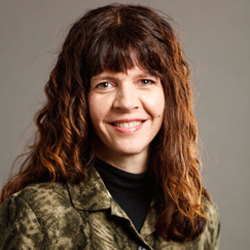
"Grace has flourished in all aspects of our rigorous doctoral program. She is a mature, highly skilled therapist and researcher who has been a delight to work with. Her passion to improve the lives of others is inspiring, and we are excited to see all that she will undoubtedly accomplish in the future."
-Dr. Jennifer Aube, Professor of Psychology and Director of Graduate Psychology Programs
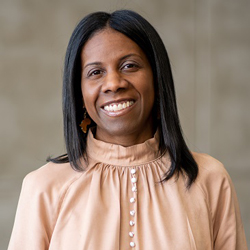
"Grace is an outstanding graduate student, mom, and friend! She’s passionate about the field of clinical psychology, gives it her all, and inspires her peers to do the same.
"She is an astute practitioner and researcher. She is an active and critical thinker affording her the ability to make novel and significant contributions to the field. She is definitely one to look out for!"
-Dr. Sonnette Bascoe, Assistant Professor of Psychology
Do you know an exceptional and current Roberts Wesleyan student? We're looking for anything notable, not just grades – have they earned a new job, award, or internship? Started a business? Whatever makes your ears perk up, let us know. Click here to recommend a student.
